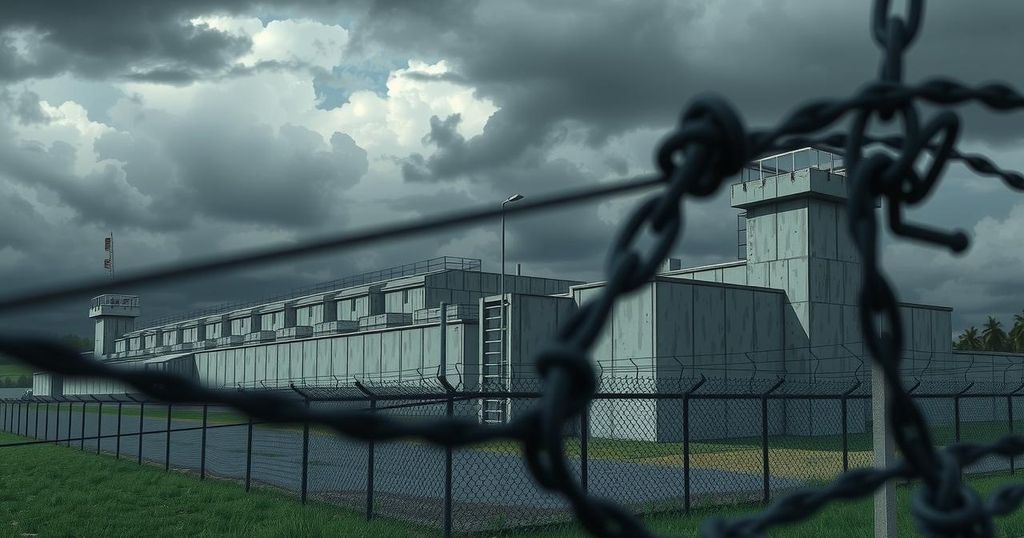Crime
ABC NEWS, ASIA, CRIME, CUBA, EL PASO, EL SALVADOR, ES, ESCALONA, EXTRADITION, IMMIGRATION AND CUSTOMS ENFORCEMENT, JUSTICE, LAW, MAIKER ESPINOZA ESCALONA, NORTH AMERICA, PHILIPPINES, PRISON SENTENCE, RAIDA, SOUTH AMERICA, TRE, TREN DE ARAGUA, TRUMP, U. S, U. S. IMMIGRATION AND CUSTOMS ENFORCEMENT, UNITED STATES, VENEZUELA, VIOLENCE, YO
Michael Grant
0 Comments
Alleged Gang Members Deported to El Salvador: A Closer Examination
The Trump administration has deported over 200 alleged Venezuelan gang members to El Salvador, asserting concerns of public safety while many detainees lack criminal records. Families of the deported individuals deny gang affiliations and express fears for their loved ones’ safety. Key cases include individuals like Maiker Espinoza Escalona and Jerce Reyes Barrios, whose deportations were thoroughly contested by their families, spotlighting ambiguities in immigration enforcement practices.
In recent weeks, the Trump administration has deported over 200 alleged Venezuelan gang members to a notorious mega-prison in El Salvador. This facility has a notable history of human rights violations. Notably, U.S. Immigration and Customs Enforcement (ICE) officials reported that many of these individuals do not have criminal records in the United States, yet they regard them as potential threats, emphasizing the insufficient information surrounding each case. Families of those deported have contested these gang allegations in legal filings, expressing fears for their loved ones’ safety
The first individual, Maiker Espinoza Escalona, was deported under the Title 8 statute on March 30, after being detained while seeking asylum with his family. His family vehemently denies accusations linking him to the Venezuela-based gang, Tren de Aragua, declaring the claims fabricated. According to his sister, Escalona sought work as a barber in the U.S. to improve his family’s fortunes.
Jose Franco Caraballo Tiapa, a 26-year-old asylum seeker, was deported on March 15. After undergoing a routine check-in with ICE, he was detained without any prior criminal incidence. His wife, Ivannoa Sanchez, confirmed that he had a scheduled court appearance related to his asylum case. Sanchez expressed disbelief at the ordeal, noting that they sought the U.S. for safety and freedom, only to encounter unforeseen chaos.
Francisco Garcia Casique also faced deportation on March 15 after being detained during a routine ICE appointment. He entered the U.S. intending to start a barbering career, yet was sent back to El Salvador where his family realized he was among those featured in White House social media. His brother lamented the situation, describing it as a nightmare for their family.
Kilmar Armando Abrego Garcia was another victim of mismanagement; he was deported on March 15 after an alleged administrative error related to his immigration status. Abrego Garcia had fled gang violence in El Salvador and obtained protective status. His attorneys denied any gang affiliation, challenging the accusations leveled against him.
Jerce Reyes Barrios, a former professional soccer player in Venezuela, was also deported due to accusations of gang ties stemming from a tattoo commemorating Real Madrid. His attorney pointed out that the tattoo was misinterpreted, and Reyes Barrios possessed no criminal record. Border officials defended the deportation, arguing that CAT protocols were followed in identifying him as a gang member.
The forced deportations of alleged gang members to El Salvador have raised significant concerns regarding human rights and wrongful accusations. Family members consistently deny any gang affiliations of their loved ones, emphasizing the lack of evidence and transparent processes behind these actions. As these cases unfold, they spotlight the complexities and challenges faced by vulnerable populations seeking asylum in the United States, often meeting with bureaucratic missteps and grave consequences.
Original Source: abcnews.go.com




Post Comment